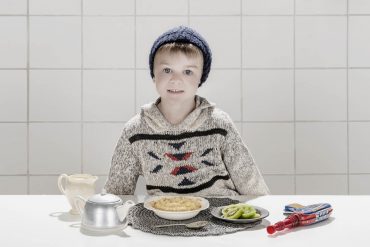By Lisa Sunbury
Calmly setting and holding to necessary limits can be trying for parents, especially in the face of a toddler’s strong feelings of displeasure or upset. One of the most frequent questions I receive from parents is “How do I set or hold a limit when my child is upset?” For instance, “It’s time to get dressed, and my child is refusing. We have to leave in 15 minutes to get to childcare, so that I can get to work on time. He can’t go to childcare in his diaper, but he won’t cooperate, even though I’ve given him time, and offered him choices of what to wear. I’ve tried distracting him and bribing him, and explaining the reasons he has to get dressed. I don’t want to force him, but I don’t know what to do. It’s almost impossible to dress a screaming, kicking child, and I hate to see him so upset.”
Often, in instances like this, parents are tempted to give in or give up, or they wear themselves out trying to reason with their toddler, and they may become frustrated when they give choice after choice, but their toddler rejects every option. Sometimes, parents resort to yelling or spanking, or sometimes, they end up bringing a diaper-clad but otherwise naked toddler to childcare, and asking for help!
The answer to this question is to pause to allow for and acknowledge your toddler’s feelings, and then, to calmly carry on. But what does this look and sound like in practice?
Parent and teacher, Sarah Morrison, sheds some light based on a realization she had after attending a conference held in Sacramento, in October of last year, where she listened to a keynote speech given by RIE Associate Janet Lansbury.
Sarah writes: “I think I just had an epiphany. I was just sitting here, meditating on Janet Lansbury’s keynote talk about acknowledging emotions. One thing she said that I’ve really tried to implement is removing “but” from my vocabulary when I acknowledge a child’s feelings. Typically, adults say things like, “You really want that toy, BUT it is Ryan’s.” “You don’t want to get into the car, BUT we are running late and we need to go right now.”
Somehow, when you include the “but” and everything that follows, it seems to invalidate the preceding part of the statement. As an example, if I was overwhelmed and stressed to the limit with my responsibilities and poured my heart out to my husband and he replied, “You are so, so unhappy right now. You feel like there’s just too much on your plate, BUT you’re the one who is home during the day and these things still need to get done”, I would NOT feel very understood.
ANYWAY, that’s not what my epiphany was. As I was meditating on Janet’s presentation, I suddenly realized that RIE (Resources For Infant Educarers, the organization and approach founded by Magda Gerber) is not about treating children like mini-adults (a common misinterpretation of Magda Gerber’s philosophy), it’s about treating them with the understanding that they are PEOPLE. A child’s brain does not have the same developed powers of logic and reasoning that a fully formed adult brain has, therefore, it’s unreasonable to present them with our wonderfully reasoned, logical, and intricate arguments for and against every limit that must be set. It’s not appropriate for us to give toddlers complete autonomy in choices of nutrition, proper clothing, or safety and health issues. It is our responsibility to make these decisions and hold these limits without wavering in the face of their displeasure, but to do it with love and empathy for their feelings.
I suddenly realized that RIE is not about treating children like mini-adults (a common misinterpretation of Magda Gerber’s philosophy), it’s about treating them with the understanding that they are PEOPLE.
“You don’t want to eat the broccoli on your plate. You wish I had served more banana muffins instead of broccoli! You are in charge of what you put in your body. If you don’t want to eat it, leave it on your plate.”
This doesn’t change the fact that I’m serving broccoli for dinner and I’ll probably serve it again next week. I’m not going to offer a banana muffin instead, or explain why broccoli is good for my child and why she should eat it. Having broccoli on our plates tonight is just the way the world is. I can acknowledge her feelings, (“You don’t want broccoli, you wish we had something else”), and remind her of her agency (“You’re in charge of what you put in your body. You may leave it on your plate”).
See next page for the rest of the article…











